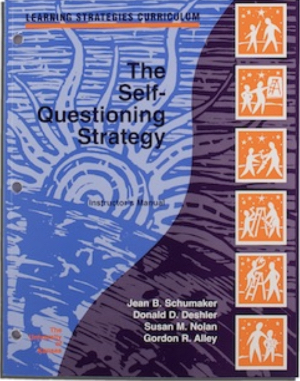The Self-Questioning Strategy

The Self-Questioning Strategy helps students create their own motivation for reading. Students create questions in their minds, predict the answers to those questions, search for the answers to those questions as they read, and paraphrase the answers to themselves.
In research studies, students showed average gains of 40 percentage points in reading comprehension of grade-level materials after they learned the strategy.
Author(s):Jean B. Schumaker, Donald D. Deshler, Susan M. Nolan, and Gordon R. Alley
Publication Info: University of Kansas, Center for Research on Learning 1994
Resources:
Research Articles:
- Schumaker, J.B., Deshler, D.D., Woodruff, S.K., Hock, M.F., Bulgren, J.A., & Lenz, B.K. (2006). Reading strategy interventions: Can literacy outcomes be enhanced for at-risk adolescents? Teaching Exceptional Children, 38(3), 64-68. In two studies, students who learned reading strategies outperformed students who did not.
- Clark, F. L., Deshler, D. D., Schumaker, J. B., Alley, G. R., & Warner, M. M. (1984). Visual imagery and self-questioning: Strategies to improve comprehension of written material. Journal of Learning Disabilities, 17(3), 145-149. https://doi.org/10.1177/002221948401700304
The Story Behind the Self-Questioning Strategy from author Jean Schumaker
At the beginning of our work at the Institute for Research on Learning Disabilities in the 1970s, we did a descriptive study where we tested the academic skills of two groups of students at the junior high and high school levels: students who had been diagnosed as having learning disabilities (LD), and students who were receiving failing or barely passing grades on their report cards in subject-area classes (low-achievers). We learned that both groups of students had severe reading deficits. The students with LD were reading on average at the fourth-grade level in seventh grade. The low achievers were reading on average at the fifth-grade level in seventh grade. What was even more distressing is that these groups of students did not make progress in reading skills across the remaining grade levels. As twelfth graders, the students with LD were still reading at the fourth-grade level, and the low achievers were still reading at the fifth-grade level on average.
Our research team was charged with developing instructional materials that could be used to improve dramatically the reading skills of these students within a relatively short period of time. As a result, we designed and empirically tested the effects of a number of instructional packages for teaching students cognitive reading comprehension strategies. The Self-Questioning Strategy was specifically designed with the goal of improving student comprehension of expository and narrative text. It is comprised of a number of cognitive steps that students can use while reading to find information that makes them wonder, ask themselves questions about that information, predict what the answers to their questions will be, find answers to those questions, and talk with themselves about the answers to their questions. Research has shown that as students become more proficient at using the Self-questioning Strategy, their comprehension and retention of written information improves commensurately.
Author's Thoughts about Strategic Reading Instruction
Strategic instruction is one of the few instructional methods that have been shown to be effective through empirical research to produce improvement in the learning and academic performance of at-risk students. The study conducted on the Self-Questioning Strategy showed that students can gain several grade levels in reading within a few weeks of instruction when the strategy is taught with fidelity. Thus, instruction in this strategy can be used to “close the gap” between students’ skills and what they are required to do in their required secondary courses. This is an instructional package that can be used in triage situations where secondary students need to learn reading skills quickly so that they can succeed in required high school courses. An important caution is that Self-Questioning Strategy instruction produces the best results when the strategy is taught to small groups of students and when students are required to meet mastery within materials written at the students’ grade level.
Teacher and Student Feedback on the Self-Questioning Strategy Program
This program and the other reading strategy programs have been very popular with both teachers and students. Literally thousands of teachers have learned to teach the Self-Questioning Strategy across the nation, and they have reported that students’ reading skills have improved dramatically. Teachers have used the program successfully in a variety of settings including resource rooms, reading classes, tutoring settings, summer school programs, and after-school programs.
There are multiple products associated with this strategy. Instructor materials are available through the KUCRL Shop. Student materials are published by Edge Enterprises, Inc.
Please note that professional development, coaching, and infrastructure support are essential components to effective implementation of SIM instructional tools and interventions. It is highly recommended that you work with a SIM professional developer. See the SIM Event list for sessions or email simpd@ku.edu to learn more.
An accessible version of the documents on this site will be made available upon request. Please contact the KU CRL Professional Development Research Institute, at simpd@ku.edu to request the document be made available in an accessible format.